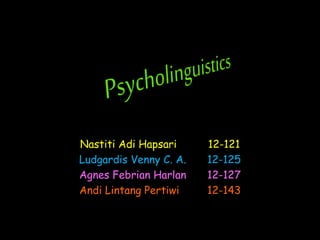
Psycholinguistics
- 1. Nastiti Adi Hapsari 12-121 Ludgardis Venny C. A. 12-125 Agnes Febrian Harlan 12-127 Andi Lintang Pertiwi 12-143
- 2. Psycholingustics is a study of language and the mind. This explores what goes on human’s mind as an individual acquires, comprehends, produces, and stores language.
- 3. Psycholinguistics Evidence The mind cannot be directly observed 1. Observation of spontaneous utterances more informative learn from child’s mistake, e.g. saying foots instead of feet 2. Psycholinguistics experiments ‘lexical decision task’ recognizing a word as being a word, e.g. vleesidence
- 4. Acquiring Language • Language has all the characteristics of maturationally controlled behavior. • Animal behavior natural : dogs bark unnatural : dogs are taught to beg • Individuals will reach the maturation, so they are biologically ready to learn the behavior from their surroundings.
- 5. The Content-Process Controversy • Each person is innately programmed to speak. • Children are social beings who have a great need to interact with those around them. - the social nature of language - the role of parents • Humans are naturally ‘tuned in’ to language. They instinctively pick out speech sounds, and know how to build them into linguistics grammars.
- 6. The Rule-governed Nature of Child Language The learning processes of children are more complex because they are not simply imitating what they hear going on around them. • A child might first use the mere word “what” in a phrase with a single verb, example: - What mummy doing? - What daddy doing? • Then only gradually extend it to other verbs, as in: - What kitty eating? - What mummy sewing?
- 7. Learning the Meaning of Words • When children have to learn not only the syntax and sounds of their language, but also the meaning of words. • Undergeneralization Snow = white, meanwhile paper ≠ white • Overgeneralization small things: crumb shiny things: moon
- 8. Doing It by Hands • Sign language = used for them who can’t hear • Sign language is important for children to start acquiring it young. • In Nicaragua, a community of deaf youngsters has invented its own sign language.
- 9. Recognizing Words Listeners were asked to interpret the following sentence: - Paint the fence and the ?ate gate - Check the calendar and the ?ate date How do speakers make the guesses?
- 10. • Serial processing the liistener check through the possible candidate one after the other • Parallel processing the possibilities are considered subconsciously at the same time
- 11. Understanding Syntax The boy kicked the ball threw it back. Most people feel that there is something wrong with it, that there is a word left out somewhere, and that it would preferably be: The boy who kicked the ball threw it back The boy kicked the ball, then threw it back.
- 12. Speech Production • Speech production involves at least two types of process - Words selection - Integration to syntax • Useful clues to those processes: - Slips of the tongue - Pauses (where the speaker stops to think)
- 13. Slips of the tongue Selection errors Assemblage errors e.g. Please hand me the tin-opener (nut-crackers) e.g. A poppy of my caper (a copy of my paper)
- 14. Selection errors tell us how individual words are stored and selected. Assemblage errors indicate how whole sequences are organized ready for production. For example, mistakes nearly always take place within a single ‘tone-group’. Example: antidote for ‘anecdote’, confusion for ‘conclusion’
- 15. Speech Disorders speakers have some speech, but speech a rather odd kind. e.g. Rabbit = apple and rhubarb speak fluently but tend to make no sense. e.g. I can’t mention the tarripoi. a state where someone talks with no grammar. e.g. “Why.. Errr.. No.. Barbara wife.... And..., oh...” Aphasia Fluent Aphasia Agrammatism
- 16. Language and the Brain • Left : controls right side more powerful and dominant • Right : controls left side Hemisphere Right Left